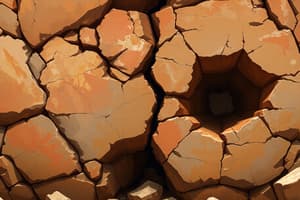Podcast
Questions and Answers
What is the primary characteristic of mechanical weathering?
What is the primary characteristic of mechanical weathering?
- Physical breakdown of rocks without changing chemical composition (correct)
- Complete disintegration of rocks into dust
- Chemical breakdown of rocks
- Formation of new minerals in rocks
How does crystal expansion contribute to mechanical weathering?
How does crystal expansion contribute to mechanical weathering?
- It speeds up the chemical breakdown of rocks
- It exerts force on rocks through wind erosion
- It results in the formation of new minerals in rocks
- It causes rocks to fracture when water freezes inside them (correct)
Which force causes rocks to fracture due to repeated freezing and thawing cycles?
Which force causes rocks to fracture due to repeated freezing and thawing cycles?
- Crystal expansion
- Temperature changes (correct)
- Gravity
- Wind
Which of the following would be categorized as a cause of mechanical weathering?
Which of the following would be categorized as a cause of mechanical weathering?
How do ocean waves contribute to mechanical weathering at the coast?
How do ocean waves contribute to mechanical weathering at the coast?
What is the main difference between mechanical and chemical weathering?
What is the main difference between mechanical and chemical weathering?
Which type of weathering causes rocks to dissolve and expand as they absorb salts from ocean spray?
Which type of weathering causes rocks to dissolve and expand as they absorb salts from ocean spray?
What is one of the consequences of mechanical weathering mentioned in the text?
What is one of the consequences of mechanical weathering mentioned in the text?
How does unloading contribute to rock breakage?
How does unloading contribute to rock breakage?
Why is mechanical weathering considered a critical process in the formation of soil?
Why is mechanical weathering considered a critical process in the formation of soil?
Flashcards are hidden until you start studying
Study Notes
Mechanical Weathering: Nature's Gently Eroding Force
Ever seen a smooth pebble or a jagged mountain range? These landscapes, both grand and minute, are shaped by a process known as mechanical weathering, a fundamental part of Earth's ever-evolving surface. As we delve into the realm of mechanical weathering, let's uncover its workings and the forces that shape our world.
What is Mechanical Weathering?
Mechanical weathering refers to the physical breakdown of rocks into smaller fragments without changing their chemical composition. This process is driven by various forces that act upon rocks, breaking them apart at the atomic level.
Causes of Mechanical Weathering
- Crystal expansion: As water seeps into rocks and freezes, the ice expands and fractures the rock.
- Temperature changes: Thermal expansion and contraction of rocks lead to cracking and fracturing.
- Gravity: The weight of rock mass, particularly on steep slopes, causes rocks to fracture and break apart.
- Freeze-thaw cycles: Repeated cycles of freezing and thawing cause rocks to expand and contract, weakening their integrity.
- Biological activity: Roots, burrowing animals, and plants can exert force on rocks, breaking them apart.
- Wind: High-velocity winds can dislodge particles from cliff faces.
- Ocean waves: Surf action and tidal forces break rocks apart at the coast.
Types of Mechanical Weathering
- Exfoliation: This type of weathering occurs when a rock's outer layers peel away due to pressure and temperature changes.
- Frost wedging: As ice expands within cracks in rocks, it exerts force, causing the rock to break apart.
- Unloading: When rocks are no longer supported, gravity causes them to collapse and break up.
- Abrasion: Rocks are broken down by being ground against other rocks.
- Salt weathering: Rocks dissolve and expand as they absorb salts from ocean spray, causing them to break apart.
Consequences of Mechanical Weathering
- Creation of soil: Mechanical weathering is a critical process in the formation of soil as rocks are broken down into smaller, more manageable particles.
- Shape modification: Rocks undergo visible changes in shape and size due to mechanical weathering.
- Landscaping: Mechanical weathering contributes to the formation of valleys, canyons, mountains, and other landforms.
Mechanical Weathering vs. Chemical Weathering
While mechanical weathering breaks rocks into smaller pieces without changing their chemical composition, chemical weathering transforms rocks into new substances. Both processes work together to create diverse landscapes, and it is the combination of these forces that enables Earth's dynamic surface to evolve and adapt over time.
As we delve further into the fascinating world of geology, we discover that mechanical weathering is just one of many processes that shape our planet. This understanding not only enhances our appreciation for the beauty of our natural world but also helps us comprehend the underlying forces driving our planet's ever-changing landscape.
Studying That Suits You
Use AI to generate personalized quizzes and flashcards to suit your learning preferences.




